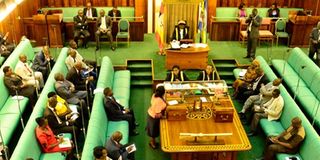Prime
Minimum academic qualifications important for political leaders

Some MPs said Uganda should reciprocate Kenya’s treatment of Ugandans.
What you need to know:
We need a leadership that will spur advancement in technology, innovation and development but not one that will stagnate Uganda. This requires a leadership that does not only concentrate on today’s problems but looks into the future and projects a Uganda in the next 50 or 100 years. Unfortunately, that kind of leadership is not among the illiterate that Mulera is advocating for.
This is a response to Muniini Mulera’s letter to Tingasiga that was published in the Daily Monitor of June 14. In his letter, Mulera expresses that politicians should not be required to have any minimum qualifications in order to vie for leadership. I find this view very satirical and unfortunate.
Politicians need a minimum level of qualification to effectively represent their constituencies and perform other functions that come with their offices. I will explain why. Political leaders, both at local government and parliamentary level, are representatives of the people in these assemblies. Both the Constitution of Uganda and the Local Government Act prescribe their roles as:
•Representation: Where these leaders have to represent the interests of the electoral areas in Parliament of local council assemblies. This is usually achieved through interactive processes between leaders and citizen groups to ensure that appropriate and robust laws (by-laws) are passed and implemented, with their impacts monitored. Through their engagement with their constituents, these elected leaders gather feedback from the communities on the state of service provision. They work with selected committees to connect more effectively with constituencies, utilising information accessed to inform Parliamentary or local council debates and policy.
•Legislation: A function where elected leaders in their assemblies discuss real issues affecting the citizens, policies and laws impacting service delivery.
•Oversight: The political leaders are supposed to provide oversight over government. Through various committees, they track policy implementation and budget spending by national and local government organs so as to increase transparency and accountability in service delivery. These leaders must effectively engage various stakeholders at local and central government levels for more effective delivery of services to the people that elected them. They thus require skills to scrutinise, analyse and make sense of budgets, work plans, expenditures and relate with various outcomes in various sectors.
Such roles of representation, legislation and oversight have increasingly become sophisticated that one requires an academic qualification. The examples that Mulera gives as, “unsurpassed leadership skills of illiterate men, among them Ngorogoza, Karegyesa, Rukeribuga, Rwomushana, Kakwenza, Katabaazi and Mukombe” are very irrelevant today.
It is important to note that demands and roles which they performed then are totally different from what is required of our current leadership. A politician must possess the aptitude to understand the complexities of their challenges to take the development engine forward. Without a certain level of education, it becomes difficult for a politician to have a grasp over the real issues of the people.
As a representative of people at large, it always helps a political leader to remain well-informed. He or she obviously needs some academic backing to be able to acquire knowledge and be in sync with the developments taking place around them. One might argue that visionary leaders in the past were not always erudite scholars. True. But that doesn’t offset the fact that the political landscape has gone through a drastic change in the post-globalisation era.
During the financial year 2014/15, the Advocates Coalition for Development and Environment (ACODE), with support from the Democratic Governance Facility and USAID-GAPP, conducted an assessment of performance of councillors at the district level in 26 Districts. The Local Government Councils’ Scorecard Report 2014/15 report revealed that on average, those with higher education levels scored higher and the average scores steadily increased with the level of education. The correlation between the level of education and the overall performance was found to be statistically significant.
We need a leadership that will spur advancement in technology, innovation and development but not one that will stagnate Uganda. This requires a leadership that does not only concentrate on today’s problems but looks into the future and projects a Uganda in the next 50 or 100 years. Unfortunately, that kind of leadership is not among the illiterate that Mulera is advocating for.
The Articles in the Constitution that require possession of an Advanced Level Certificate or equivalent as one of the conditions for qualification to be president, Member of Parliament or district chairperson, should even be strengthened to raise the bar to a minimum of a Bachelor’s Degree or its equivalent. The same clause should be duly included in the local government Act, which currently doesn’t require any minimum academic qualification for one to be a councillor at district and sub-county councils.
I believe that some people will argue that this will disenfranchise citizens without such qualifications but it will be a step towards improving the quality of leadership in this country. Again, those without such qualifications can be absorbed and useful in other platforms. Character, communication skills, respectability among other virtues should be part of the package but not the only ones.
Mr Mbabazi is a researcher at ACODE.
[email protected] .




